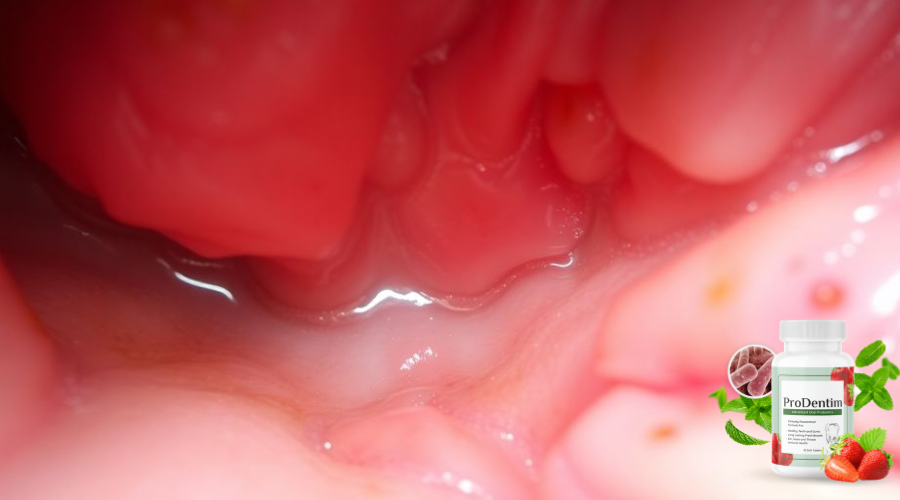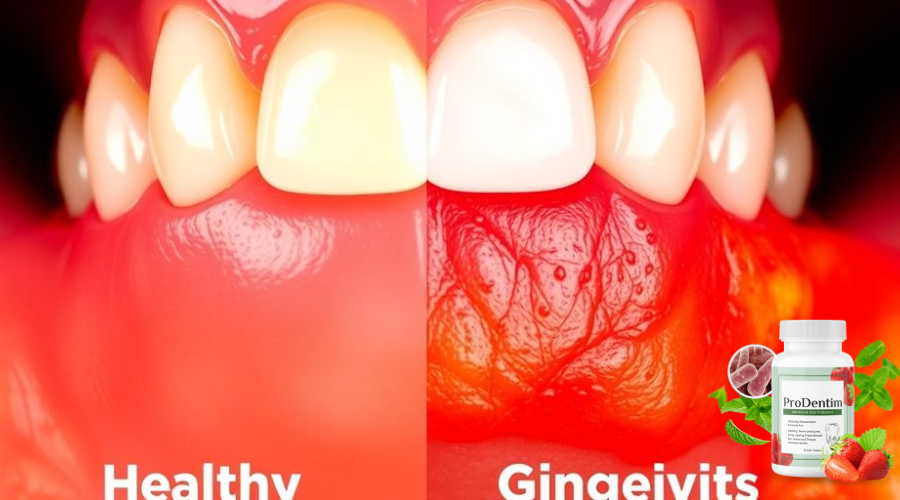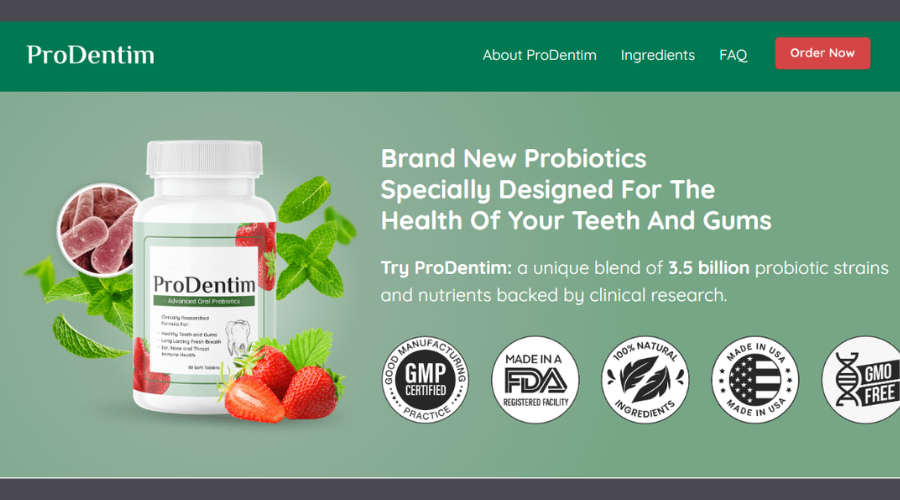Gingivitis Cause
Gingivitis, a common gum issue, often starts with plaque build-up. This sticky film of bacteria can really mess with your gums if you’re not careful. Not brushing and flossing regularly? You’re asking for trouble. But there’s more to it. Things like smoking, certain health conditions, and even stress can make your gums suffer. And let’s not forget about what you eat or don’t eat. ProDentim is here to help, though, offering a way to keep your gums in check.
Key Takeaways
- Plaque is a major player in causing gingivitis; it forms when oral hygiene is lacking.
- Smoking and stress are big contributors to gum issues, making prevention tougher.
- Hormonal changes, like during pregnancy, can increase gingivitis risk.
- ProDentim can aid in maintaining oral health and preventing gum problems.
- Nutritional deficiencies, such as lack of vitamins, also play a role in gum health.
Understanding the Causes of Gingivitis

Role of Plaque and Tartar
Gingivitis starts with plaque, a sticky, colorless film of bacteria that forms on your teeth. If you’re not brushing and flossing daily, plaque can harden into tartar, also known as calculus, which is much tougher to remove. The presence of tartar provides a safe haven for bacteria, leading to gum irritation and inflammation. Regular dental cleanings are crucial because only a professional can remove tartar effectively.
Impact of Poor Oral Hygiene
Skipping good oral hygiene practices is like sending an open invitation to gingivitis. Not brushing your teeth at least twice a day or failing to floss can allow plaque to build up, inviting gum problems. It’s not just about brushing; it’s about doing it right. Poor technique can leave behind plaque, eventually leading to gum disease.
Influence of Diet on Gum Health
What you eat matters a lot when it comes to your gums. Diets high in sugars and starches can feed the bacteria in plaque, making it easier for them to grow. Consider cutting down on sugary snacks and drinks. Instead, focus on a balanced diet rich in fruits, vegetables, and whole grains. These foods promote overall health and can help keep your gums in good shape.
Gingivitis might seem minor, but if left unchecked, it can escalate into more severe gum diseases, potentially leading to tooth loss. Maintaining a consistent oral care routine and watching your diet are simple steps that can prevent this common gum issue.
The Connection Between ProDentim and Gum Health
How ProDentim Supports Oral Hygiene
ProDentim is not just another oral health product; it’s a game-changer for maintaining gum health. This innovative supplement is packed with beneficial ingredients that help reduce gum inflammation and support overall immune health. By targeting the root causes of gum issues, ProDentim plays a crucial role in promoting oral hygiene. Its unique formula works to balance the oral microbiome, which is essential for preventing the overgrowth of harmful bacteria that lead to gingivitis.
Benefits of ProDentim for Gingivitis Prevention
Using ProDentim can significantly aid in the prevention of gingivitis. Here’s how it helps:
- Reduces Inflammation: The active ingredients in ProDentim are designed to soothe and heal inflamed gums.
- Strengthens Immune Response: By enhancing immune health, ProDentim helps your body fight off infections more effectively.
- Promotes Healthy Gums: Regular use of ProDentim can lead to healthier, more resilient gums.
ProDentim’s Role in Reducing Plaque
Plaque buildup is a leading cause of gingivitis, and ProDentim is formulated to tackle this issue head-on. The ingredients in ProDentim work synergistically to break down plaque and prevent its formation. This not only helps in maintaining cleaner teeth but also significantly reduces the risk of gum disease. By incorporating ProDentim into your daily routine, you’re taking a proactive step towards better oral health.
ProDentim’s ingredients are designed to reduce gum inflammation and enhance immune health. Research indicates a link between oral health and respiratory conditions, highlighting the importance of maintaining good oral hygiene for overall well-being.
For more on how ProDentim can improve your gum health, check out ProDentim’s ingredients.
Lifestyle Factors Contributing to Gingivitis
Effects of Smoking and Tobacco Use
Smoking and chewing tobacco are significant contributors to gum disease. Smokers are twice as likely to develop gum issues compared to non-smokers. This is because tobacco can reduce blood flow to the gums, making it harder for the body to fight off infections. Plus, it can make gum disease treatments less effective. Quitting tobacco is a big step towards better gum health.
Hormonal Changes and Gum Disease
Hormonal shifts, especially in women, can affect gum health. During pregnancy, puberty, menstruation, and menopause, changes in hormone levels can make gums more sensitive and prone to inflammation. Pregnant women, in particular, should maintain good oral hygiene to avoid complications like gingivitis, which often improves after childbirth.
Impact of Stress and Obesity
Stress isn’t just a mental health issue—it can also impact your gums. High stress levels can weaken the immune system, making it easier for infections like gingivitis to take hold. Similarly, obesity is linked to increased inflammation in the body, including the gums. Managing stress and maintaining a healthy weight can therefore help in reducing the risk of gum disease.
Understanding these lifestyle factors and their impact on gum health is crucial for gingivitis prevention. By addressing these issues, you can significantly reduce the risk of gum disease and maintain healthier gums.
Medical Conditions and Medications Affecting Gum Health
Diabetes and Gingivitis Risk
Diabetes is a big player when it comes to gum health. People with diabetes have a higher risk of developing gingivitis. This is because high blood sugar levels can lead to more sugar in the saliva, which feeds harmful bacteria in the mouth. Keeping blood sugar levels in check is crucial to prevent this. Regular dental check-ups and maintaining good oral hygiene can help manage the risk.
Medications That Influence Gum Health
Certain medications can have side effects that affect your gums. Some drugs, like calcium channel blockers and immunosuppressants, can cause gum overgrowth or gingival hyperplasia. This can make it harder to clean your teeth properly, leading to plaque build-up and, eventually, gingivitis. If you’re on such medications, it’s important to talk to your dentist about how to manage these effects.
Immune System Disorders and Gum Disease
An immune system that’s not working properly can also lead to gum problems. Conditions like HIV/AIDS or leukemia lower the body’s ability to fight infections, including those in the gums. People with these conditions need to be extra vigilant about their oral hygiene. Regular dental visits and possibly more frequent cleanings might be necessary to keep gingivitis at bay.
When dealing with gum health, it’s not just about brushing and flossing. Understanding how your health conditions and medications impact your gums can make a huge difference in preventing gingivitis.
Nutritional Deficiencies and Their Impact on Gums
Importance of Vitamins for Gum Health
Vitamins play a vital role in maintaining healthy gums. Vitamin C, for instance, is essential for the production of collagen, which helps keep your gums strong and resilient. A lack of vitamin C can lead to bleeding gums and increase the risk of gingivitis. On the other hand, vitamin D supports calcium absorption, which is crucial for maintaining bone density, including the bones that support your teeth.
Role of Omega-3 Fatty Acids
Omega-3 fatty acids are known for their anti-inflammatory properties. They can help reduce inflammation in the gums, potentially lowering the risk of gum disease. Including foods rich in omega-3s, like fish and flaxseeds, in your diet might be beneficial for your oral health. Some studies suggest that omega-3s, when combined with professional dental care, can be effective in managing severe gum diseases.
Calcium and Gum Disease Prevention
Calcium is not only crucial for strong bones but also for healthy teeth and gums. A deficiency in calcium can lead to weakened teeth and increase the risk of periodontal diseases. Dairy products, leafy greens, and fortified foods are excellent sources of calcium that can help maintain gum health.
A balanced diet rich in essential nutrients is key to preventing gum disease. While brushing and flossing are important, what you eat also plays a significant role in your oral health.
In conclusion, addressing nutritional deficiencies is essential for maintaining healthy gums and preventing gingivitis. By ensuring adequate intake of vitamins, omega-3 fatty acids, and calcium, you can support your gum health and reduce the risk of gum disease.
Genetic and Age-Related Factors in Gingivitis
Family History and Genetic Predisposition
Gingivitis, a common gum disease, isn’t just about how well you brush your teeth. Genetics can play a big role in whether you’re prone to gingivitis. If your parents or siblings have had gum disease, you might be more likely to face it too. It’s not just about inheriting bad habits; some folks are naturally more susceptible due to their genes. But don’t worry, having a genetic predisposition doesn’t seal your fate. With the right oral care, you can keep your gums healthy.
Aging and Increased Risk of Gum Disease
As you get older, your risk for gingivitis goes up. Why? Well, the immune system tends to weaken with age, making it harder to fight off infections, including those in your gums. Plus, older adults often face challenges like arthritis, which can make brushing and flossing properly a bit tricky. And let’s not forget, the longer you live, the more exposure your gums have had to plaque and tartar.
Gender Differences in Gum Health
Interestingly, men and women might experience gum disease differently. Hormonal changes in women, like those during pregnancy or menopause, can make gums more sensitive and prone to inflammation. Men, on the other hand, are statistically less likely to visit the dentist regularly, which can lead to neglected gum health. Understanding these gender differences can help tailor preventive measures more effectively.
Keeping up with regular dental check-ups and maintaining good oral hygiene is key, regardless of age or genetic background. It’s never too late to start taking better care of your gums.
Preventive Measures and Treatments for Gingivitis

Effective Oral Hygiene Practices
Keeping your gums healthy starts with everyday habits. Brushing your teeth twice a day with fluoride toothpaste is a must. Don’t forget to floss daily to remove any food particles stuck between your teeth. Consider using an antimicrobial mouthwash, which can help zap bacteria that your toothbrush might miss. And hey, if you’re into gadgets, an electric toothbrush can be a game-changer.
Professional Dental Treatments
Regular dental visits are crucial. Your dentist will clean your teeth to remove tartar that brushing and flossing can’t reach. They might do a deep cleaning procedure called scaling and root planing if things are more serious. This gets rid of plaque under the gums and smooths the roots so bacteria can’t stick around. If needed, your dentist may also fix any dental work that’s not fitting right, like crowns or fillings.
Role of ProDentim in Gum Disease Management
ProDentim is a product that supports oral health. It’s known for reducing plaque and promoting healthy gums. Including it in your routine can be beneficial, especially if you’re prone to gingivitis. It’s kind of like giving your gums an extra layer of protection. Just remember, it’s not a replacement for brushing and flossing but a solid addition to your oral care arsenal.
Keeping your gums healthy is all about consistency. Stick to your oral hygiene routine, visit your dentist regularly, and consider products like ProDentim for added support. Your gums will thank you.
Conclusion
So, there you have it. Gingivitis might sound like a big, scary word, but it’s really just a wake-up call for better oral care. It’s mostly about keeping that pesky plaque at bay with regular brushing and flossing. Sure, things like smoking, certain meds, and even your genes can play a part, but the power to prevent it is mostly in your hands. If you notice your gums acting up, don’t wait around. A quick trip to the dentist can save you a lot of trouble down the road. Remember, healthy gums are just as important as healthy teeth. Keep them both in check, and your smile will thank you!
Frequently Asked Questions
What causes gingivitis?
Gingivitis is often caused by the build-up of plaque, a sticky film of bacteria on the teeth. If not cleaned off daily, it can irritate the gums and lead to gingivitis.
Can smoking lead to gum disease?
Yes, smoking is a big risk factor for gum disease. It can make the gums more prone to infection and harder to heal.
How does diet affect gum health?
Eating too much sugar and starch can feed the bacteria that cause plaque. A balanced diet with vitamins is important for healthy gums.
Is gingivitis reversible?
Yes, gingivitis can be reversed with good brushing, flossing, and regular dental check-ups.
Can stress impact gum health?
Stress can weaken the immune system, making it easier for gum disease to develop.
What role does ProDentim play in oral health?
ProDentim helps maintain oral hygiene by reducing plaque and supporting healthy gums.


